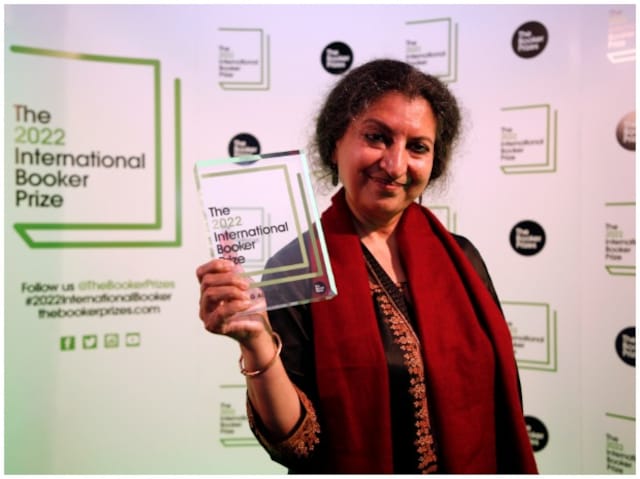It is not often that a novel winning a coveted international prize becomes a binding force seeking to bridge gaps between communities, nations, religions, genders and even languages. When it does, it sends into raptures lovers of literature as much as political-religious-linguistic activists who are against divisive tendencies. This is the reason why Geetanjali Shree’s novel ‘Tomb of Sand’, originally ‘Ret Samadhi’ in Hindi, winning the prestigious International Booker Prize has created such a world-wide sensation. It is not only a triumph of literary ventures in an Indian language, but also of South Asian languages as the winner has rightly said to the international audience. The book along with its international acclaim is relevant for the current state of affairs of present day India and the rest of the world torn by divisions of all kinds and forms. The chair of the judging panel, Frank Wynne, rightly explained the implications of the story handled in a spirit of fun and humour when he said the “luminous novel of India and partition” weaves a magic welding together with great compassion youth and age, male and female, family and nation into a kaleidoscopic whole.
Set in northern India, the novel tells the story of an 80-year-old woman protagonist who, to her family’s consternation, insists on travelling to Pakistan. She slips into a deep depression when her husband dies, but then she recovers from her depression and gains a new lease of life. The woman travels to Pakistan to confront the unresolved trauma of her teenage experiences of partition and re-evaluates what it means to be a mother, a daughter, a woman and a feminist. The serious tale is told in a light-hearted manner not to make light of it, but to reinforce deeper truths even more effectively. As Geetanjali herself said after receiving the award that when one handles a heavy thing with lightness, one actually increases the poignancy and it puts a different kind of focus on it.
The importance of the book in the contemporary world is immense which is why it has struck such a chord with the readers and the judges. It speaks of the pluralism and polyphony of the world. The present times are witnessing sordid attempts by one dominant group, political party or a ruler to stifle the voice of others and impose a monolithic socio-cultural-political vision and narrative pushing the world to the brink of war and conflict. Mankind is being divided in the name of religion. The journey of the protagonist from India to Pakistan in search of meaning in life and composite culture is not only a commentary on the religious and political tensions prevailing now, but also on the situation facing the international community at large.
As the scope of literature becomes narrow if it is used for advancing any doctrine or creed, the jury refrained from specifying the appeal of the novel to the present day reality in the world. Though the title of the book – Tomb of Sand – sounds sombre, it is playful and funny, light but not slight with a carnival of characters. As the novelist emphasises, “it is an important way to focus attention and also the best way to live. To get some fun in spite of the serious things.”
The serious things in the book are borders and divisions between religions, genders and nations – notably between India and Pakistan, as a result of the partition of India in 1947. Shree was born 10 years after the partition, but says that even though her generation does not remember the partition, “we very much live with it, particularly the ideology it has unleashed, that supposes that these two major communities in the subcontinent cannot live together.”
Shree was born Geetanjali Pandey but changed her surname to her mother’s forename. The anecdote that she shared with the media after receiving the award is illustrative of the influences that shaped her into an advocate of women’s identity and feminine voice in a male-dominated society. “It was in adolescence, when I got my first bank account, and with a great flourish I signed my full name,” she said. But her father, a civil servant, insisted that she just sign her first name, because a woman’s name changes after marriage. This made Shree think why her mother’s name was nowhere, though it was she who played such a big role in bringing her up. So when she started writing, she decided to take her mother’s first name as her second name. Hence, her pen name has no surname.
The bilingual novel – the Hindi original is translated by American painter and prolific translator Daisy Rockwell – is yet another literary and linguistic triumph, especially in the context of India where the present dispensation has been trying to impose Hindi on the entire country. The book would have ignited the passions of zealots who advocate Hindi supplanting all other languages as the national language. But, the author herself snubbed a questioner who asked why she had added the English version to the original tome in Hindi. She said it is not an “either or” situation. When asked if she fears that Hindi may be getting overshadowed by English in some ways in India, the author stressed there is no problem in being bilingual or trilingual or multilingual. She believes humans have the capacity to know more than one language. The country should just have an education system which encourages people to know their mother tongue, or another Indian language and English. “But it gets completely riddled with politics and becomes a kind of unresolvable problem,” she lamented.
Truly, literature has the power to rise above politics, race and languages.
